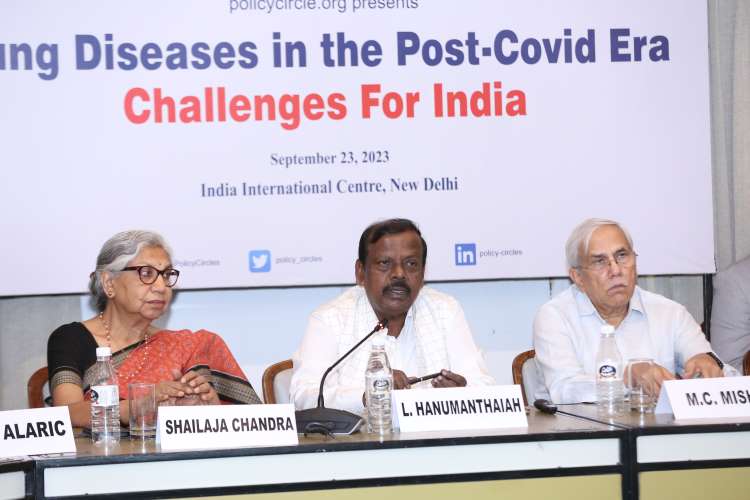In the post-COVID era, the challenge of lung diseases has become a serious problem for the nation. As a member of the parliamentary standing committee on health and family welfare, I have been exposed to a multitude of pressing problems. During the tumultuous times of the COVID-19 pandemic, the standing committee grappled with numerous concerns, including the affordability of cancer treatment. However, the focus of public health extends beyond mere treatment – it is about prevention.
The parliamentary committee, composed of dedicated individuals from diverse backgrounds, including medical experts, policymakers, and public health professionals, serves as a critical forum for addressing some of the most pressing health challenges facing our country. Through our deliberations, we look to shape policies that can make a tangible difference in the lives of the citizens. It is a responsibility I take seriously, given the gravity of the issues we confront.
In our fight against non-communicable diseases, cancer stands out as a formidable adversary. Yet, my belief is that it is equally vital to thwart the disease before it takes control of our bodies. A multitude of factors contribute to the spread of such ailments. Tobacco use remains an entrenched issue despite endless campaigns declaring its detrimental effects, and lung diseases are similarly on the rise.
READ I Rajasthan’s road safety crisis: A wake-up call to save lives on highways
Urbanisation and public health
Urbanisation and modernisation, while necessary, come at a cost. They bring about a host of health issues that we struggle to address adequately. Across the world, urbanisation is inevitable, driven by livelihoods, employment opportunities, and the allure of urban amenities that rural areas often lack. Our cities are growing rapidly, but they are not growing thoughtfully. The burden of respiratory diseases, especially in densely populated urban areas, is on the rise.
Environmental concerns add another layer of complexity to our health challenges. We must prioritise enabling our citizens to live peacefully and healthily. But our cities, even those we once celebrated as pristine, are now grappling with pollution, congestion, and inadequate urban planning. This impacts our lung health, a recent public health concern that has gained prominence.
Our discussions often revolve around individual health issues, such as lung diseases attributed to air pollution. However, these problems are not confined within city limits. They transcend geographical boundaries, linking us with neighbouring states and countries. To address air pollution in Delhi, for instance, we must also consider its impact on surrounding regions.
Our pursuit of industrial growth is relentless, yet we tend to overlook the environmental consequences. We need a holistic approach that prioritises public transport, encourages environmentally friendly agriculture, and integrates health considerations into urban planning. Air pollution, for instance, is not Delhi’s problem alone; it is a collective problem that demands a comprehensive solution.
The most vulnerable sections of society, namely the urban and rural poor, bear the brunt of these health and environmental hazards. It is our collective responsibility to demand holistic health checkups for all citizens, aimed not just at identifying diseases but also at increasing life expectancy and ensuring a peaceful life free from health concerns.
Unified health card
Preventive healthcare is at the heart of our efforts to combat the rising tide of health challenges. While addressing diseases and providing treatments is vital, preventing them from occurring is equally crucial. It is high time we consider implementing a comprehensive preventive healthcare system. One tangible step towards this goal is the issuance of health cards to every citizen. These health cards would serve as a repository of an individual’s health information, including regular check-ups, immunisations, and lifestyle habits. By providing easy access to one’s health history, these cards empower individuals to take proactive measures towards their well-being.
A unified health card system will enable healthcare providers to offer personalised guidance and interventions, tailored to each citizen’s unique health profile. Through these cards, we can encourage regular health check-ups, screenings, and vaccinations, fostering a culture of early detection and prevention. This proactive approach, coupled with public awareness campaigns, can significantly reduce the burden of preventable diseases, ensuring a healthier and more resilient society.
Our approach to tackling lung diseases should not be myopic. It must encompass a broad spectrum of issues, including environmental concerns, climate change, and overall public health. Rather than waiting for a crisis to spur us into action, we must take a proactive stance. Initiatives like the one we are discussing today, focused on lung diseases, play a crucial role in signalling to society and governments the impending dangers.
It is my sincere hope that the experts and organisations involved in this initiative provide valuable insights to the government and the health department. Rest assured, I will champion your recommendations in the health committee, advocating for the necessary initiatives to secure a healthier future for our nation.
(Dr L Hanumanthaiah is a Rajya Sabha member from Karnataka. This article is the edited transcript of his speech at a roundtable on, Lung diseases in the post-Covid era – Challenges for India, organised by Policy Circle at the India International Centre on September 23.)

